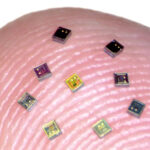Researchers at Tokyo University of Science (TUS) have developed a flexible paper-based sensor composed of nanocellulose and zinc oxide (ZnO) nanoparticles that operate like the human eyes and brain. The sensor is energy-efficient, responds to optical input in real-time, and is both flexible and easy to dispose of, making it ideal for health monitoring applications. […]
Wearable sensing technologies
How do brain-computer interfaces use sensors?
Brain-Computer Interface (BCI) activated prosthetics, and other applications need sensors to provide feedback. Intensive work has been and continues to be done in this area. For example, researchers have reported their progress on an electroencephalogram (EEG)-based motor imagery BCI to control the movement of a prosthetic hand. The hand was instrumented with force and angle […]
AI-enhanced accelerometers equipped with latest standard I3C interface
STMicroelectronics has launched three new accelerometers with advanced processing engines built-in to extend sensor autonomy, enabling systems to respond more quickly to external events while lowering power consumption. The LIS2DUX12 and LIS2DUXS12 leverage ST’s third-generation MEMS technology, adding programmable capabilities including a machine-learning core (MLC), advanced finite state machine (FSM), and an enhanced pedometer. A third entry-level […]



